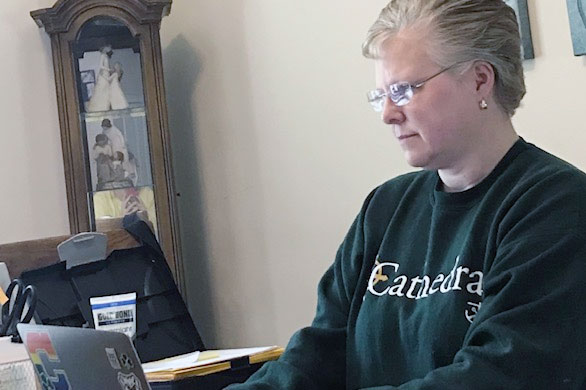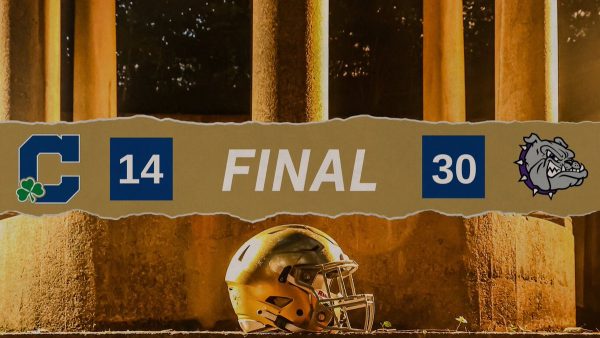Counselor offers SAT and ACT advice to juniors
Testing scheduled in June on campus still on — for now

Couselor Mrs. Kathy Pivonka said families should be aware of upcoming college admissions deadlines.
Among the number of events canceled due to COVID-19, the spring session of the SATs and ACTs have been shut down. For juniors who had planned to take these tests, the biggest concern is about college applications.
College counselor Ms. Kathy Pivonka brings some insight on how to prepare for the next available tests and reassure juniors.
Pivonka explained the difference between two. “The ACT test measures what a student has learned in high school while the SAT tends to focus on what the student is capable of learning,” she wrote in an email.
“There are some students who do better on the SAT and others do better on the ACT, which is why we recommend both at Cathedral High School.” While the SAT and ACT are standardized tests used in the college admissions process, it is not required for every college. In fact, the tests are not the biggest factor and more colleges each year are not require either test.
Pivonka said, “The transcript and (what is shows about) rigor, grades, trends; extracurricular activities; recommendations and essays are also key components. The transcript would be the most important of all the requirements.”
At this time, juniors are recommended to sign up for the June 6 SAT date and June 13 ACT date, which, as of now, will both be hosted at Cathedral.
While the country is social distancing, Pivonka gives advice on how to prepare for the standardized tests and strengthen juniors’ previously learned knowledge.
She said, “Since one-on-one tutoring (unless done online) and classes are not an option at this time, students should utilize the free resources available to them. Khan Academy (through the College Board website) and ACT Academy (through the ACT website) are free resources that have proven to be great preparation for students if they spend time using it.”
Pivonka shares news that is comforting to many juniors who have yet to take the SAT or ACT: some colleges are choosing to make these tests optional. Pivonka said, “There are colleges and universities stepping up, more and more each week, announcing that they are going test-optional for at least the next year, (with) some up to three years and some permanently.”
Pivonka provided the website fairtest.org for students who want to see if their potential college or university will change requirements. Included on the list as of early April were notable Indiana schools including Ball State University, DePauw University and Indiana University. Pivonka said she encouraged students to check this site often, as updates are frequenlty made.
However, Pivonka does not want to discourage students from taking the SAT and ACT. She said, “That does not mean you should not take the ACT and SAT, but it may give some students the opportunity to research potential schools without the panic that they did not have the ideal circumstances in which to test to their best ability.”
Pivonka added, “Also, keep an eye out to see if the College Board or ACT will add any tests in the fall. I have not seen any official announcements yet, but am hopeful that students will have the opportunities they need.”
As for the juniors who were signed up to take the SAT and ACT this spring, they spoke about their biggest concerns with the cancellation. Junior Julia Reasinger had planned to take the SAT in March and June, and after taking the school’s SAT prep course, she said she was a bit disappointed to not be able to take the test.
Reasinger explained her concern about not being aware of what comes next. “We don’t really know when this is all going to end, so it’s hard for (College Board) to really have a plan if they don’t know anything.” Since she hasn’t taken the SAT yet, Reasinger is also concerned how close it will be to college application time before she can take the test.
Junior Troix McClendon was also signed up for the March test and completed the SAT prep course. She voiced her own concerns: “I was going to apply for early action at Howard University and there’s a cut-off date for when you can take the last SAT. I was going to take the SAT more than once.”
Junior Brooklynn Thorpe had signed up to take the March and May SATs, receiving private tutoring from a friend of her mother. Her biggest concern, she said, is “that I’m not going to be able to get the scores that I want for applying with early action next year.” Thorpe also is also planning to attend Howard University.
Reasinger said, “I wish that people would stay in the house and follow the rules people in charge have been putting in place.”
McClendon said, “I think that we shouldn’t have to take the SAT because of the coronavirus. It’s creating more stress and that means we have to do everything in a smaller time frame than what was planned.”
Thorpe said, “I’m hoping that colleges will see that this is a bigger issue and for the class(es) of 2020 and 2021, they’ll ease up on the requirements for the SAT and ACT. Not everyone had the opportunity to do their testing during the winter or some people would prefer to do it in the spring after they got a majority of their school work. I’m hoping that colleges will be more laxed and understanding with our year.”
Pivonka sent a special message to the Class of 2021: “This will be a college application cycle that is different than any I have encountered in my 30 years on the high school and college side of the desk. College counselors are ready to help and support the Class of 2021 with the entire process, no matter how many obstacles get thrown in our path.”

Whitley Walton is a junior and a reporter for the Megaphone. She is involved in EMBRACE Club, Black Student Union, GSA Alliance and Girl Up and is also...






